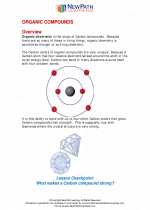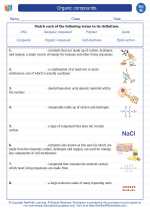Base
In chemistry, a base is a substance that can accept a proton (H+) or donate an electron pair. Bases are the chemical opposite of acids. When a base is dissolved in water, it increases the concentration of hydroxide ions (OH-) in the solution.
Properties of Bases:
- Bitter taste
- Slippery feel
- Turns red litmus paper blue
- Conducts electricity when dissolved in water
- Reacts with acids to form salts and water (neutralization reaction)
Common Bases:
Some common bases include:
- Sodium hydroxide (NaOH)
- Potassium hydroxide (KOH)
- Calcium hydroxide (Ca(OH)2)
- Ammonia (NH3)
Uses of Bases:
Bases have various practical applications, including:
- Manufacture of soap and detergents
- Neutralizing acids in industrial processes
- Regulating pH in agriculture
- As cleaning agents
Study Guide:
When studying bases, it's important to understand their properties, common examples, and practical uses. Be sure to familiarize yourself with the concept of pH and how bases affect the pH of a solution. Practice identifying bases from their chemical formulas and understanding their reactions with acids. Additionally, explore the environmental and industrial impact of bases and their role in everyday products.
It's also helpful to conduct experiments to observe the properties of bases and their reactions in a laboratory setting. This hands-on approach can deepen your understanding of the topic.
Finally, make use of online resources, textbooks, and practice problems to reinforce your knowledge of bases and solidify your understanding of this fundamental concept in chemistry.
.◂Science Worksheets and Study Guides Eighth Grade. Organic compounds

 Worksheet/Answer key
Worksheet/Answer key
 Worksheet/Answer key
Worksheet/Answer key
 Worksheet/Answer key
Worksheet/Answer key
 Vocabulary/Answer key
Vocabulary/Answer key
 Vocabulary/Answer key
Vocabulary/Answer key
